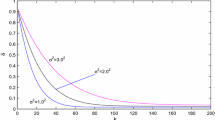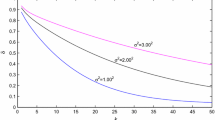Abstract
This paper combines the maximum likelihood principle with the data filtering technique for parameter estimation of bilinear systems with autoregressive moving average noise. We give the input–output representation of the bilinear systems through eliminating the state variables in the model. Based on the obtained model, we use an estimated noise transfer function to filter the input–output data and derive a filtering-based maximum likelihood gradient iterative algorithm for identifying the parameters of bilinear systems with colored noises. A gradient-based iterative algorithm is given for comparison. The simulation results indicate that the proposed algorithm is effective for identifying bilinear systems.



Similar content being viewed by others
References
A.T. Abebe, C.G. Kang, Iterative order recursive least square estimation for exploiting frame-wise sparsity in compressive sensing-based MTC. IEEE Commun. Lett. 20(5), 1018–1021 (2016)
C. Boukis, D.P. Mandic, A.G. Constantinides, A class of stochastic gradient algorithms with exponentiated error cost functions. Digit. Signal Process. 19(2), 201–212 (2009)
F.Y. Chen, F. Ding, A. Alsaedi, T. Hayat, Data filtering based multi-innovation extended gradient method for controlled autoregressive autoregressive moving average systems using the maximum likelihood principle. Math. Comput. Simul. 132, 53–67 (2017)
F.Y. Chen, F. Ding, J.H. Li, Maximum likelihood gradient-based iterative estimation algorithm for a class of input nonlinear controlled autoregressive ARMA systems. Nonlinear Dyn. 79(2), 927–936 (2015)
M.T. Chen, F. Ding, L. Xu, T. Hayat, A. Alsaedi, Iterative identification algorithms for bilinear-in-parameter systems with autoregressive moving average noise. J. Frankl. Inst. 354(17), 7885–7898 (2017)
H. Dai, N.K. Sinha, Robust recursive least-squares method with modified weights for bilinear system identification. IEE Proc. D Control Theory Appl. 136(3), 122–126 (1989)
M. Dehghan, M. Hajarian, An iterative method for solving the generalized coupled Sylvester matrix equations over generalized bisymmetric matrices. Appl. Math. Modell. 34(3), 639–654 (2010)
J.L. Ding, Recursive and iterative least squares parameter estimation algorithms for multiple-input-output-error systems with autoregressive noise. Circuits Syst. Signal Process. (2018). https://doi.org/10.1007/s00034-017-0636-0
F. Ding, D.D. Meng, J.Y. Dai, Q.S. Li, A. Alsaedi, T. Hayat, Least squares based iterative parameter identification for stochastic dynamical systems with ARMA noise using the model equivalence. Int. J. Control Autom Syst. (2018). https://doi.org/10.1007/s12555-017-0001-x
F. Ding, X.H. Wang, Hierarchical stochastic gradient algorithm and its performance analysis for a class of bilinear-in-parameter systems. Circuits Syst. Signal Process. 36(4), 1393–1405 (2017)
F. Ding, Y.J. Wang, J.Y. Dai et al., A recursive least squares parameter estimation algorithm for output nonlinear autoregressive systems using the input-output data filtering. J. Frankl. Inst. 354(15), 6938–6955 (2017)
F. Ding, X.H. Wang, L. Mao, L. Xu, Joint state and multi-innovation parameter estimation for time-delay linear systems and its convergence based on the Kalman filtering. Digit. Signal Process. 62, 211–223 (2017)
F. Ding, L. Xu, L.J. Guo, F.E. Alsaadi, T. Hayat, Parameter identification for pseudo-linear systems with ARMA noise using the filtering technique. IET Control Theory Appl. (2018). https://doi.org/10.1049/iet-cta.2017.0821
H.L. Gao, C.C. Yin, The perturbed sparre Andersen model with a threshold dividend strategy. J. Comput. Appl. Math. 220(1–2), 394–408 (2008)
E. Ghadimi, I. Shames, M. Johansson, Multi-step gradient methods for networked optimization. IEEE Trans. Signal Process. 61(21), 5417–5429 (2013)
S. Gibson, A. Wills, B. Ninness, Maximum-likelihood parameter estimation of bilinear systems. IEEE Trans. Autom. Control 50(10), 1581–1596 (2005)
C.P. Gong, W.Q. Wang, F.C. Li, H. Cheung, Sparsity-aware transmit beamspace design for FDA-MIMO radar. Signal Process. 144, 99–103 (2018)
Y. Ji, F. Ding, Multiperiodicity and exponential attractivity of neural networks with mixed delays. Circuits Syst. Signal Process. 36(6), 2558–2573 (2017)
S.X. Jing, T.H. Pan, Z.M. Li, Recursive bayesian algorithm with covariance resetting for identification of Box–Jenkins systems with non-uniformly sampled input data. Circuits Syst. Signal Process. 35(3), 919–932 (2016)
N. Kawaria, R. Patidar, N.V. George, Parameter estimation of MIMO bilinear systems using a Levy shuffled frog leaping algorithm. Soft Comput. 21(14), 3849–3858 (2017)
M.H. Li, X.M. Liu, The least squares based iterative algorithms for parameter estimation of a bilinear system with autoregressive noise using the data filtering technique. Signal Process. 147, 23–34 (2018)
M.H. Li, X.M. Liu et al., Least-squares-based iterative and gradient-based iterative estimation algorithms for bilinear systems. Nonlinear Dyn. 89(1), 197–211 (2017)
M.H. Li, X.M. Liu et al., The maximum likelihood least squares based iterative estimation algorithm for bilinear systems with autoregressive moving average noise. J. Frankl. Inst. 354(12), 4861–4881 (2017)
M.H. Li, X.M. Liu et al., The gradient based iterative estimation algorithms for bilinear systems with autoregressive noise. Circuits Syst. Signal Process. 36(11), 4541–4568 (2017)
Y. Lin, W. Zhang, Necessary/sufficient conditions for pareto optimum in cooperative difference game. Optim. Control Appl. Methods (2018). https://doi.org/10.1002/oca.2395
F. Liu, H.X. Wu, Singular integrals related to homogeneous mappings in Triebel–Lizorkin spaces. J. Math. Inequal. 11(4), 1075–1097 (2017)
F. Liu, Continuity and approximate differentiability of multisublinear fractional maximal functions. Math. Inequal. Appl. 21(1), 25–40 (2018)
F. Liu, H.X. Wu, Regularity of discrete multisublinear fractional maximal functions. Sci. China Math. 60(8), 1461–1476 (2017)
F. Liu, H.X. Wu, On the regularity of maximal operators supported by submanifolds. J. Math. Anal. Appl. 453(1), 144–158 (2017)
F. Liu, On the Triebel–Lizorkin space boundedness of Marcinkiewicz integrals along compound surfaces. Math. Inequal. Appl. 20(2), 515–535 (2017)
F. Liu, Q.Y. Xue, K. Yabuta, Rough maximal singular integral and maximal operators supported by subvarieties on Triebel–Lizorkin spaces. Nonlinear Anal. 171, 41–72 (2018)
D.D. Meng, Recursive least squares and multi-innovation gradient estimation algorithms for bilinear stochastic systems. Circuits Syst. Signal Process. 36(3), 1052–1065 (2017)
S.M.E. Sahraeian, M.A. Akhaee, B. Sankur, F. Marvasti, Information hiding with maximum likelihood detector for correlated signals. Digit. Signal Process. 36, 144–155 (2015)
Y.J. Wang, F. Ding, Recursive least squares algorithm and gradient algorithm for Hammerstein–Wiener systems using the data filtering. Nonlinear Dyn. 84(2), 1045–1053 (2016)
Y.J. Wang, F. Ding, L. Xu, Some new results of designing an IIR filter with colored noise for signal processing. Digit. Signal Process. 72, 44–58 (2018)
D.Q. Wang, L. Mao, F. Ding, Recasted models based hierarchical extended stochastic gradient method for MIMO nonlinear systems. IET Control Theory Appl. 11(4), 476–485 (2017)
D.Q. Wang, Z. Zhang, J.Y. Yuan, Maximum likelihood estimation method for dual-rate Hammerstein systems. Int. J. Control Autom. Syst. 15(2), 698–705 (2017)
L. Xu, The damping iterative parameter identification method for dynamical systems based on the sine signal measurement. Signal Process. 120, 660–667 (2016)
L. Xu, F. Ding, Y. Gu et al., A multi-innovation state and parameter estimation algorithm for a state space system with d-step state-delay. Signal Process. 140, 97–103 (2017)
C.C. Yin, Y.Z. Wen, Exit problems for jump processes with applications to dividend problems. J. Computat. Appl. Math. 245, 30–52 (2013)
C.C. Yin, Y.Z. Wen, Optimal dividend problem with a terminal value for spectrally positive Levy processes. Insur. Math. Econ. 53(3), 769–773 (2013)
C.C. Yin, C.W. Wang, The perturbed compound Poisson risk process with investment and debit interest. Methodol. Comput. Appl. Probab. 12(3), 391–413 (2010)
C.C. Yin, K.C. Yuen, Optimality of the threshold dividend strategy for the compound Poisson model. Stat. Probab. Lett. 81(12), 1841–1846 (2011)
C.C. Yin, J.S. Zhao, Nonexponential asymptotics for the solutions of renewal equations, with applications. J. Appl. Probab. 43(3), 815–824 (2006)
W. Zhang, B.S. Chen, H-representation and applications to generalized Lyapunov equations and linear stochastic systems. IEEE Trans. Autom. Control 57(12), 3009–3022 (2012)
X. Zhang, F. Ding, A. Alsaadi, T. Hayat, Recursive parameter identification of the dynamical models for bilinear state space systems. Nonlinear Dyn. 89(4), 2415–2429 (2017)
W. Zhang, X. Lin, B.S. Chen, LaSalle-type theorem and its applications to infinite horizon optimal control of discrete-time nonlinear stochastic systems. IEEE Trans. Autom. Control 62(1), 250–261 (2017)
W. Zhang, Y. Zhao, L. Sheng, Some remarks on stability of stochastic singular systems with state-dependent noise. Automatica 51, 273–277 (2015)
N. Zhao, Y. Chen, R. Liu, M.H. Wu, W. Xiong, Monitoring strategy for relay incentive mechanism in cooperative communication networks. Comput. Electr. Eng. 60, 14–29 (2017)
N. Zhao, M.H. Wu, J.J. Chen, Android-based mobile educational platform for speech signal processing. Int. J. Electr. Eng. Educ. 54(1), 3–16 (2017)
Acknowledgements
This work was supported by the National Natural Science Foundation of China (No. 61472195) and the Taishan Scholar Project Fund of Shandong Province of China.
Author information
Authors and Affiliations
Corresponding author
Rights and permissions
About this article
Cite this article
Li, M., Liu, X. & Ding, F. Filtering-Based Maximum Likelihood Gradient Iterative Estimation Algorithm for Bilinear Systems with Autoregressive Moving Average Noise. Circuits Syst Signal Process 37, 5023–5048 (2018). https://doi.org/10.1007/s00034-018-0800-1
Received:
Revised:
Accepted:
Published:
Issue Date:
DOI: https://doi.org/10.1007/s00034-018-0800-1




